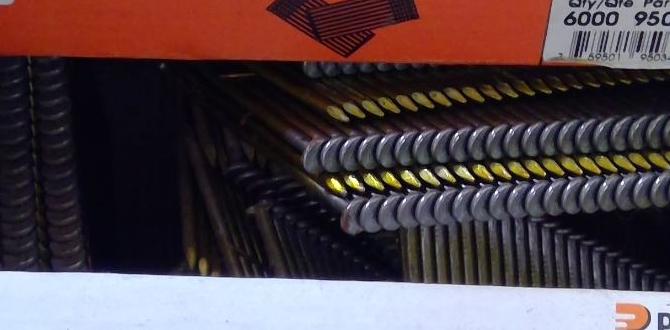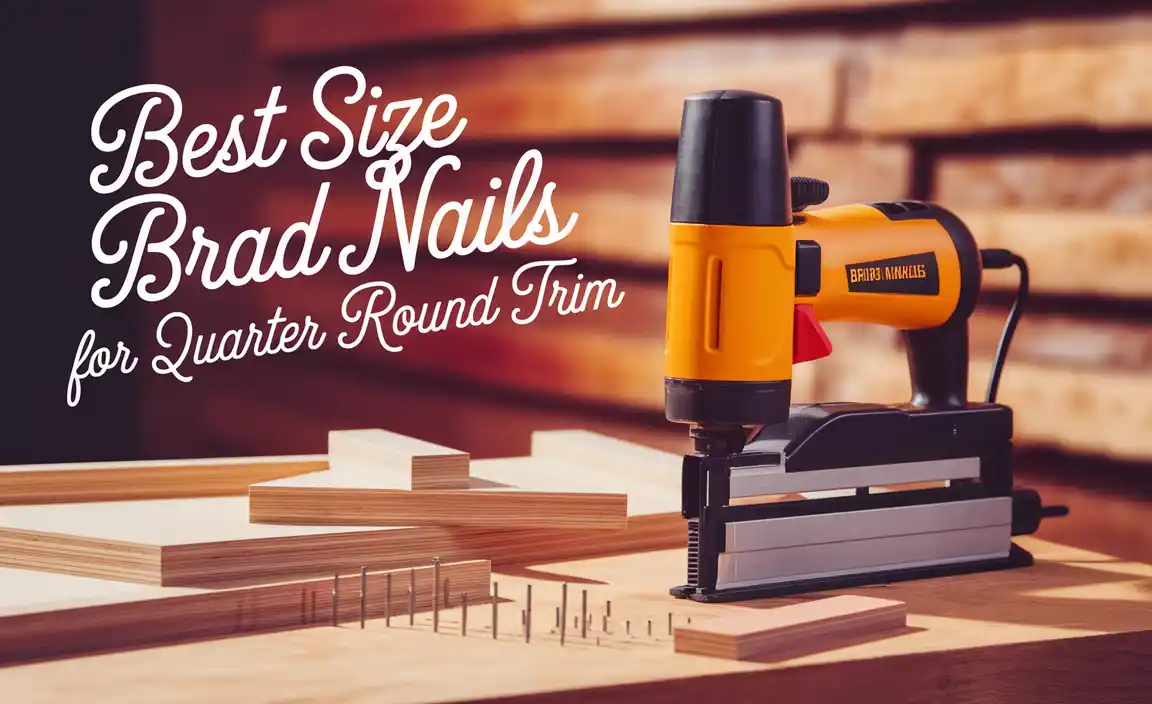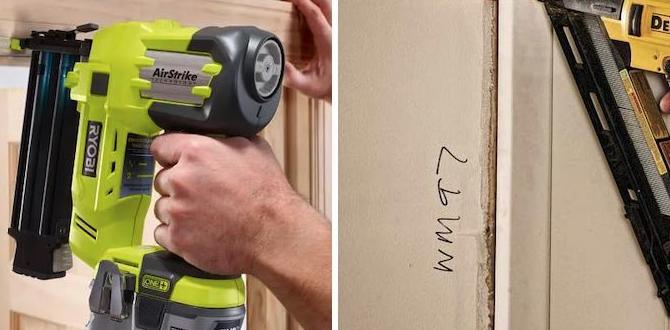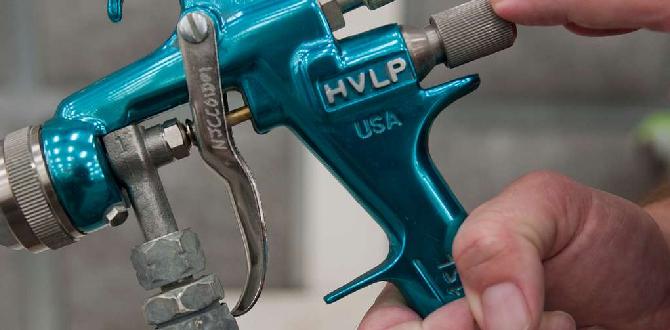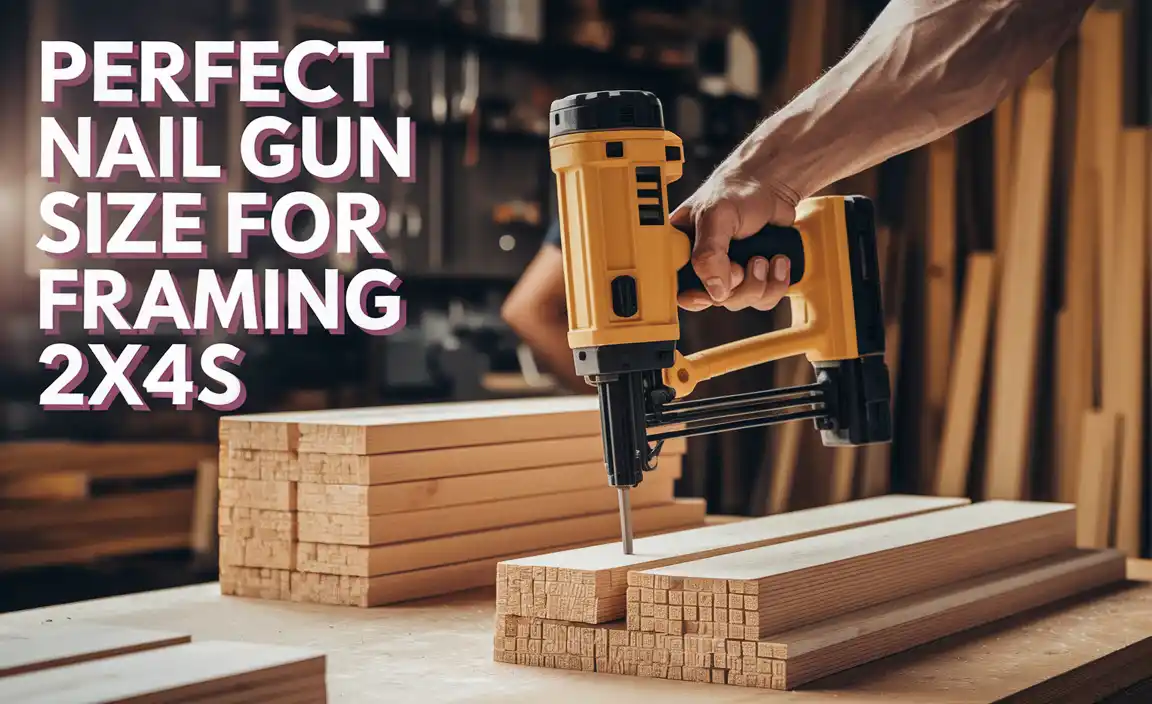Table of Contents
What Gauge Nails For Baseboards: A Comprehensive Guide
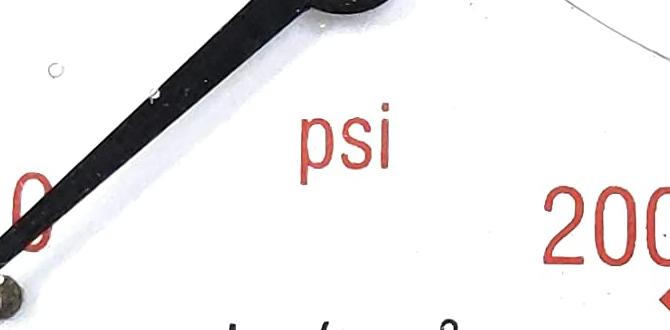
What Gauge Nails for Baseboards
Choosing the right gauge nails for baseboards is essential for a clean, sturdy finish. Most experts recommend using 18-gauge nails, as they are strong enough to hold the baseboards in place without splitting the wood. For heavier baseboards, consider 16-gauge nails for extra support. Did you know that using the wrong gauge can lead to trouble later? Nails that are too thin might not hold up well, while those that are too thick can cause damage. Keep it simple and you’ll achieve great results!Understanding Nail Gauges
Definition of nail gauge and its measurement system.. Explanation of how gauge size affects nail strength and application..Nail gauge is all about how thick a nail is. It uses a special number system. Lower numbers mean thicker nails, while higher numbers indicate thinner ones. Think of it like ice cream flavors; some are scoops, and some are mere sprinkles!
The gauge size also tells us about nail strength and how we can use them. Thicker nails, or lower gauge numbers, are stronger. They hold things better, making them great for heavy tasks. Thinner nails may bend or break easily. It’s best to match the nail size with your project, so your baseboards won’t come down faster than your favorite cartoon character!
| Gauge Size | Diameter (inches) | Usage |
|---|---|---|
| 18 | 0.0475 | Light tasks |
| 16 | 0.0625 | Medium tasks |
| 14 | 0.0750 | Heavy tasks |
Factors to Consider When Choosing Nail Gauge
Material of the baseboard (wood, MDF, etc.) and its impact on gauge selection.. Thickness of the baseboard and its compatibility with different nail gauges..Choosing the right nail gauge for baseboards can feel tricky, but it doesn’t have to be! First, consider the material. Wood, MDF, or even plastic can change your decision. For example, wood may need thicker nails for a strong hold, while MDF gets by with lighter options.
The thickness of your baseboard also matters. Thicker boards need sturdier nails. Check out this table for a quick reference:
| Baseboard Material | Suggested Nail Gauge |
|---|---|
| Wood | 16-18 |
| MDF | 18-20 |
So, don’t grab just any nail! Picking the right gauge will help your baseboards stay happy and attached. Remember: happy baseboards mean happy homes!
Recommended Nail Types for Baseboard Installation
Comparison of finish nails, brad nails, and other types suitable for baseboards.. Discussing the importance of nail type in ensuring a secure hold..Choosing the right nails for baseboards is important. Each type of nail has its own purpose. Here’s a quick comparison:
- Finish Nails: These are strong and great for holding baseboards tightly. They blend well into the wood.
- Brad Nails: Thinner than finish nails. They are better for small or delicate jobs.
- Other Nails: Options like spiral nails can be used but might not hold as well.
Using the right nail type ensures a secure hold. This keeps your baseboards looking nice and prevents them from coming loose. A good fit leads to great results!
What nail type is best for baseboards?
The best nail type for baseboards is typically finish nails. They offer strength and support, ensuring the baseboards stay in place.
Nail Length vs. Gauge: Finding the Right Balance
How nail length interacts with gauge choice for effective baseboard attachment.. Guidelines on selecting the correct length for various baseboard thicknesses..Nail length and gauge work together to hold baseboards firmly. The right length ensures strong support. A shorter nail can pull out easily, while a longer one might split the wood. Choose wisely based on thickness:
- For thin baseboards (1/2 inch), use 18-gauge nails, 1 inch long.
- For standard baseboards (3/4 inch), 16-gauge nails, 1 1/4 inches work best.
- For thicker options (1 inch), 15-gauge nails at 1 1/2 inches are ideal.
This balance provides strong, lasting results. Always aim for a snug fit!
What gauge should I use for baseboards?
Use 16-gauge or 18-gauge nails for most baseboards.Tips for Choosing Nails:
- Gauge affects strength and size.
- Longer nails hold better in thick wood.
- Test first if you’re unsure!
Tools and Techniques for Baseboard Nailing
Necessary tools for baseboard installation (e.g., nail guns, hammers).. Best practices for nailing baseboards to achieve a professional finish..Starting off, you’ll need a few handy tools for nailing those baseboards. A reliable nail gun makes quick work of this task, but a good hammer can do the trick too. For a pro finish, always choose the right nail gauge; typically, 18-gauge nails work wonders. Remember to space them about 16 inches apart for stability. And don’t forget about measuring twice! That way, you won’t need to buy extra baseboards, which could lead to a very awkward “oops” moment.
| Tool | Purpose |
|---|---|
| Nail Gun | Fast nailing |
| Hammer | Simple and classic |
| Measuring Tape | Accurate cuts |
Common Mistakes to Avoid When Nailing Baseboards
Identifying frequent errors related to nail gauge and installation.. Tips on how to avoid these pitfalls for a flawless result..People often mess up when nailing down baseboards. One common mistake is using the wrong nail gauge. If the nails are too thin, they may not hold well. If they’re too thick, they might split the wood. To dodge this problem, use 16-gauge nails—they’re just right! Another error is not nailing at the right angle. A straight shot is key! This keeps everything tight and neat.
| Common Mistakes | How to Avoid |
|---|---|
| Using the wrong nail gauge | Pick 16-gauge nails for a snug fit. |
| Nailing at a bad angle | Nail straight for a tidy finish! |
Remember, precision is your best friend! Planning ahead means fewer trips to the hardware store, so you can spend more time admiring your work (or watching funny cat videos). Happy nailing!
Maintenance and Repair of Baseboards
How gauge choice can affect maintenance and future repairs.. Strategies for repairing damaged baseboards and renailing effectively..Choosing the right nail gauge for baseboards is crucial. A *smaller gauge* nail means a *thinner* nail, perfect for light work, while a *larger gauge* is sturdier for heavy-duty tasks. If your baseboards get damaged, don’t panic! Use wood glue, clamps, or a little paint to rescue them. And remember, renailing is like giving your baseboards a comfy hug—just make sure to choose the right nails!
| Gauge | Best Uses |
|---|---|
| 18 | Trim and Baseboards |
| 16 | Heavier Trim Work |
Regularly checking your baseboards keeps them looking nice. A quick polish now and then can prevent big repairs later. So, it’s like brushing your teeth—better safe than sorry!
Conclusion
In summary, when choosing nails for baseboards, 15 to 18-gauge finish nails work best. They hold strong without splitting wood. Remember, use a nail gun for easier installation. You can also check out more resources on baseboard installation for extra tips. With the right nails, your baseboards will look great in no time!FAQs
What Gauge Nails Are Ideal For Installing Baseboards In Residential Settings?To install baseboards in homes, we usually use 16-gauge or 18-gauge nails. These nails are strong enough to hold the baseboards firmly. You can use a nail gun or a hammer to drive them in. Make sure the nails are long enough to reach the wall and the baseboard. This will help keep everything secure!
How Do The Nail Length And Gauge Affect The Stability Of Baseboards?Nail length and gauge can change how strong baseboards are. Longer nails go deeper, helping them hold better. A thicker nail, or one with a higher gauge, is sturdier and can stop the baseboard from wobbling. By using the right length and thickness, we make sure our baseboards stay in place.
Should I Use Finishing Nails Or Brad Nails For Attaching Baseboards, And What Gauge Is Recommended For Each?You should use finishing nails for attaching baseboards. They are strong and hold well. A finishing nail gauge of 16 is good. Brad nails are okay, too, but they are thinner and better for lighter jobs. You can use a 18-gauge brad nail for lighter wood and trim.
Are There Specific Nail Guns That Work Best With Different Gauges Of Nails For Baseboard Installation?Yes, different nail guns work best with different sizes, or “gauges,” of nails. For baseboard installation, a 16-gauge nail gun is often a good choice. It makes strong connections without damaging the wood. You should pick nails that match your nail gun to get the best results. Always check the instructions for your nail gun to be sure!
What Factors Should I Consider When Selecting The Right Gauge Of Nails For Various Types Of Baseboard Materials?When picking nails for your baseboards, think about the material they are made from. Softwood needs thinner nails, while hardwood needs thicker ones. You should also think about the size of the baseboard. Bigger boards may need longer nails to hold them well. Lastly, consider if you want to hide the nails. Smaller nails can be less noticeable.
